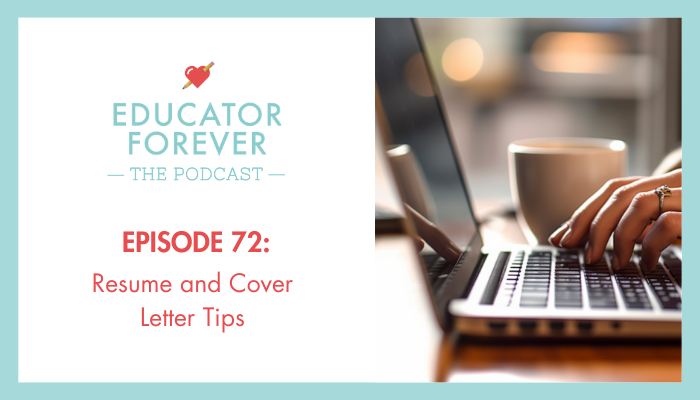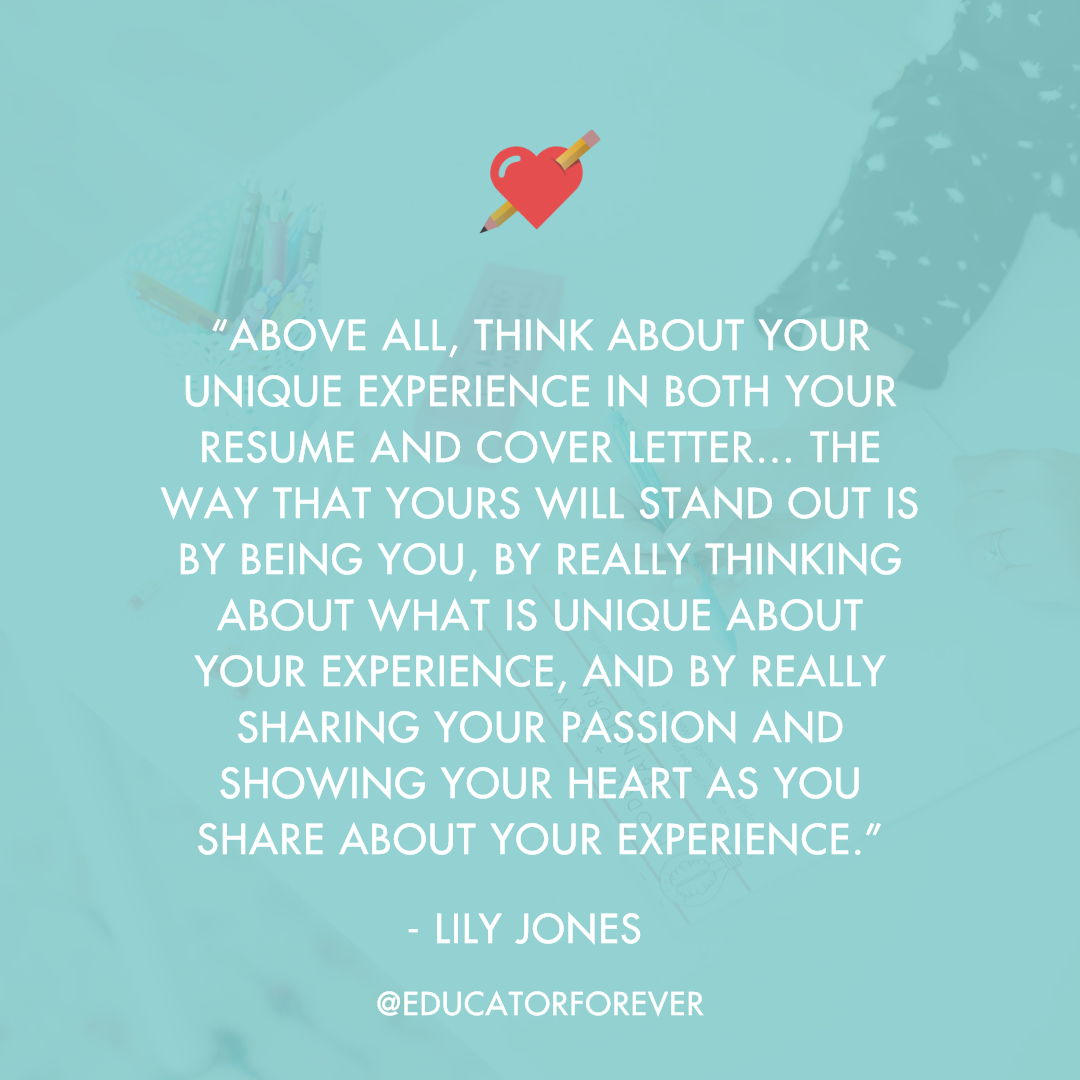Episode 72: Resume and Cover Letter Tips
When you're applying for jobs beyond the classroom, it's really important that your application materials stand out. And by that I mean your resume and your cover letter. It is so hard sometimes to write resumes and cover letters. But putting in the cognitive work is worth it. Reflecting on how your unique experience connects to the jobs that you hope to land goes a long way.
I have applied for so many jobs beyond the classroom. And I've also hired for a lot of jobs beyond the classroom. So I've seen all sorts of resumes and cover letters, and I've learned what makes them stand out. So in this episode, I want to share with you some tips for writing resumes and cover letters that will get you those jobs you hope to land.
If you’re interested in joining our Network, click here!
Topics Discussed:
Writing job-specific cover letters and resumes for every application
Making resumes short and sweet
Let your passion come through your letter
Resources mentioned:
Take our FREE quiz to nail down your next best career step in education.
If you’re enjoying this podcast, please leave a rating and review on Apple Podcasts.
Related episodes and blog posts:
Read the transcript for this episode:
Welcome to Educator Forever, where we empower teachers to innovate education. Join us each week to hear stories of teachers expanding their impacts beyond the classroom and explore ways to reimagine teaching and learning.
When you're applying for jobs beyond the classroom, it's really important that your application materials stand out. And by that I mean your resume and your cover letter. It is so hard sometimes to write resumes and cover letters. But putting in the cognitive work is worth it. Reflecting on how your unique experience connects to the jobs that you hope to land goes a long way. And it really helps your resume and cover letter shine, that you're sitting there thinking about how your experience really connects, and really making it clear and explicit what those connections are. I have applied for so many jobs beyond the classroom. And I've also hired for a lot of jobs beyond the classroom. So I've seen all sorts of resumes and cover letters, and I've learned what makes them stand out. So in this episode, I want to share with you some tips for writing resumes and cover letters that get you those jobs that you hope to land.
Let's start with resumes. The most important thing with resumes is that your resume is tailored to the specific job you hope to land. So if you're hoping to land a curriculum job, then I want your resume to be focused on curriculum. This means it's not the same resume that you use for district teaching jobs. This version of your resume pulls out all the unique experience that you've had related to creating curriculum or using curriculum or modifying curriculum. So really thinking about telling the story of you in this new position. And if you want to be a coach, let's say maybe you would create a version of your resume for instructional coaching jobs that pulls out the student teachers that you've had or mentoring experience that you've had, or professional development sessions that you've led. So really thinking about creating these different versions of your resumes for the different jobs you hope to land. Along with that, take out anything that is maybe not necessary. Resumes are precious real estate, and you want to make sure that each bullet point, each description of your experience is really telling the story you hope to tell. That means taking out anything that might be irrelevant. So maybe you have coached girls basketball for three years, not the most relevant for a curriculum job. Take that out and put down in a bullet point about something more curriculum oriented. With your resume, you do want to stay close to two pages one to two pages is fine. And make sure that it's really skimmable. Make sure that people can get the point that you have done these types of jobs before. One way that you can do that is by using headers. So you might have headers describing curriculum experience, teaching, experience, coaching experience, whatever it might be only, if that makes sense to you. But that can be a way to really set your experience apart and make it skimmable. The purpose of your resume is really to highlight your experience and to show the relevant experience that you have. And the purpose of your cover letter is really to be that bridge between your resume and the job description. Your cover letter is your opportunity to be persuasive and sell yourself for a particular job. It can also be a great way to get clear on why you're a good fit, and really get clear on how your experience connects.
While your resume is a way to show at a glance that you're a match for a job, your cover letter gives you the freedom and space to make further connections and explain more. It can be helpful to think of your cover letter as a persuasive essay, providing a thesis statement that you're the best person for the job, and then key recent reasons to support why you're an ideal candidate. By thinking of your cover letter. This way, you can create a compelling narrative that showcases your value and highlights how you're a match making you more likely to stand out and land an interview.
When writing cover letters, you want to make sure that you're writing a unique cover letter for each job that you apply for. By tailoring your cover letter to the specific position and organization you'll stand out from other applicants using generic one size fits all cover letters. This makes a difference truly when I read people's cover letters, and it's clear that they've just used the same cover letter for any job they're applying for. It doesn't really resonate with me. When I read cover letters that are really pulling apart why they want to work with my organization, then it shows that you're genuinely interested and really know about the organization you're applying for. Creating tailored cover letters shows that you've done your research and are enthusiastic about the opportunity. And it also indicates your dedication and effort that you're not simply applying for any job, but that you're genuinely interested and being part of the organization's team and contributing to their mission. So really think about pulling apart in your cover letter why you want to work for that organization, and how your experience connects, really make it tailored. That doesn't mean that if you're applying for a whole bunch of math coaching positions, you can't use the same cover letter as a starting point. But think about researching the organization and adding in key details that show why you want to work for them. And really let your passion shine through both in your resume and your cover letter. Really communicate your excitement, your enthusiasm, and that doesn't mean you have to use or that you should use a bunch of exclamation marks. But really showing why you want to work there. And not being afraid to let your own voice shine through in your cover letter. This is your chance to show what you've learned in your past positions, and connect them to the position you hope to get.
If the position you're applying for is a writing job, like a curriculum writing job, this is also a chance to show off your writing skills in your cover letter. So let your voice shine through and pull out unique experiences that you've had. Really think about some specific examples or stories that you can tell that illustrate the points that you're hoping to make that show what you've learned or how you can use what you've learned in this new position. So really think about some key points that you can pull out. And then as I said before, cover letters can be like a persuasive essay, that's a very teacher II thing to say. But the way I think about it is that the first paragraph really communicates your enthusiasm and shares your thesis statement, I am the best person for this job because of XY and Z. And then your body paragraph so really build out those reasons. So reason x, let me tell you about that. Reason why, let me tell you about that reason, Z, let me tell you about that. And then that last paragraph summarizes why you're an ideal candidate, and reiterates your excitement for the opportunity. So really thinking about specific examples, in those reasons, it's those body paragraphs that illustrate your thesis statement. So if you're applying for a math curriculum writing job, maybe your thesis statement is that you've created math curriculum, and that you've taught math to grades K five for the past 10 years. So then your body paragraphs will be about creating math curriculum. And one will be about specific strategies or approaches you've used when teaching math in grades K-five. So really think about and maybe write an outline before you create your cover letter. But really think about the specific experience that you want to share about. And above all, think about your unique experience in both your resume and cover letter. People who are hiring for jobs are reading many resumes and cover letters at once. And we want yours to stand out. The way that it's gonna stand out is by being you by really thinking about what is unique about your experience by really sharing your passion and showing your heart as you share about your experience. So please spend the time thinking about hey, why is it that I want this job? What have I learned in the past that connects to this? And how can I be most likely to land this job by sharing about this experience? Spend the time thinking this through, spend the time writing resumes and cover letters and I promise it will get easier and help you get the impacts that you want.
If you're looking for more support for writing resumes and cover letters, finding the jobs of your dreams and landing those jobs while being part of an amazing community, I would love to invite you to join our educator forever network. You can learn more about net learn that educator forever.com/network It is a monthly membership community where we talk all about how to find and land the jobs that you want to get beyond the classroom. And even more importantly, it's full of amazing educators doing all sorts of inspiring things beyond the classroom. We'd love to see you there.
Transcribed by https://otter.ai


